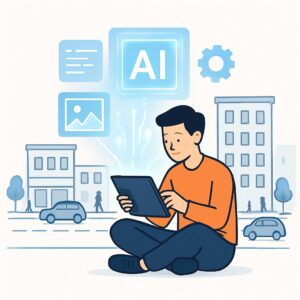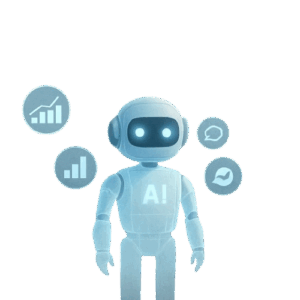Apply For Scholarship
Artificial Intelligence (AI) has evolved from being a futuristic concept into a transformative force reshaping industries across the globe. In fields like Data Science and Digital Marketing, AI is not just an enhancement tool—it’s a game-changer. From automating repetitive tasks to providing deep insights and personalizing user experiences, AI is altering the way professionals work and redefining the skills needed to succeed. While these advancements create exciting opportunities, they also bring challenges that are reshaping the modern job market.


Impact on Jobs:
While AI automates routine data tasks, it’s creating demand for advanced roles like AI model engineers, data strategy consultants, and ethical AI specialists. Professionals who combine strong statistical foundations with AI tool mastery will remain in high demand.
Digital Marketing thrives on understanding consumer behavior and delivering the right message at the right time. AI is transforming every stage of this process.
Generative AI tools can now create blog posts, ad copy, and even video scripts tailored to a brand’s voice. While some marketers fear replacement, the reality is that AI content often requires human refinement to ensure authenticity, creativity, and brand alignment.
AI analyzes customer behavior, purchase history, and browsing patterns to deliver ultra-targeted ads. Platforms like Google Ads and Facebook already use AI to optimize ad placement and bidding strategies for better ROI.
By tracking touchpoints across multiple platforms, AI can predict where a potential customer is in their buying journey and suggest actions to move them toward conversion.
AI-driven chatbots are improving customer service by handling FAQs, product recommendations, and support requests instantly—freeing up human agents to tackle complex issues.
Impact on Jobs:
While repetitive marketing tasks are being automated, AI is creating new opportunities in AI-driven campaign strategy, marketing automation management, and data-driven brand storytelling. Professionals skilled in AI analytics tools like HubSpot AI, Adobe Sensei, and Google Marketing Platform will stand out
One of the most significant impacts of AI on the job market is the rapid evolution of required skills. In AI-exposed industries like data science and digital marketing:
Professionals must embrace continuous learning to remain competitive. This includes mastering AI frameworks, understanding data ethics, and learning to collaborate effectively with AI systems.

The impact of AI on the job market is nuanced. It is not solely about replacement—it’s about transformation.
For Data Scientists: AI will handle more data wrangling and model testing, allowing scientists to focus on strategy, interpretation, and business alignment.
For Digital Marketers: AI will automate A/B testing, ad optimization, and customer segmentation, giving marketers more time for creative and strategic tasks.
However, professionals who resist upskilling risk becoming obsolete. Roles heavily dependent on repetitive digital tasks without creative or strategic elements are most at risk.
To stay ahead, professionals in data science and digital marketing should:
Invest in AI Education
Learn how AI works, not just how to use it. Understanding the fundamentals of machine learning, deep learning, and NLP will give you an edge.
Focus on Human-Centric Skills
Creativity, empathy, ethical reasoning, and leadership remain irreplaceable by AI.
Leverage AI as a Partner
Treat AI as a co-worker that handles repetitive tasks, while you focus on high-value activities.
Experiment and Innovate
Use AI tools to test new strategies, optimize processes, and explore untapped markets.
As AI adoption accelerates, the job market in data science and digital marketing will continue to evolve. New career paths like AI content strategist, data ethics officer, and predictive analytics consultant are already emerging. The key to thriving will be adaptability—embracing change, experimenting with AI tools, and combining technical expertise with human creativity.
Far from eliminating opportunities, AI has the potential to create a more efficient, insightful, and personalized business landscape. The winners in this transformation will be those who can harness AI’s capabilities while delivering the human touch that technology still cannot replicate.
Absolutely. NDMIT in Lucknow and Agra offers beginner-to-advanced learning paths, starting from fundamentals and moving toward AI-based tools, automation, and predictive analysis, making it ideal for freshers and career changers.
Adopt a mindset of continuous learning, master AI frameworks relevant to your industry, develop hybrid skill sets, and learn to collaborate with AI tools to maximize productivity and creativity.
How Artificial Intelligence is Impacting the Job Market
NDMIT stands out as a top-rated Digital Marketing Institute and Data Science Institute in Lucknow and Agra because of its AI-integrated curriculum, expert faculty, hands-on simulations, and real-world case studies that prepare students for future industry demands
Top institutes in Lucknow and Agra combine industry-relevant AI curriculum with hands-on projects, ensuring you learn both technical and strategic aspects. Whether in Digital Marketing or Data Science, these programs prepare you for real-world AI applications
Absolutely. Completing an AI-integrated Digital Marketing course in Lucknow or a Data Science course in Agra gives you a competitive edge. Employers actively seek candidates with AI expertise to lead data-driven strategies and innovative marketing campaigns.
Asia’s Leading Digital Marketing & Data Science Institute
A comprehensive methodology with the best curriculum, designed according to current corporate demands and needs.
Copyright © NDMIT Edusoft Private Limited
For security purposes, please solve this simple puzzle to verify you are human before sending an OTP.